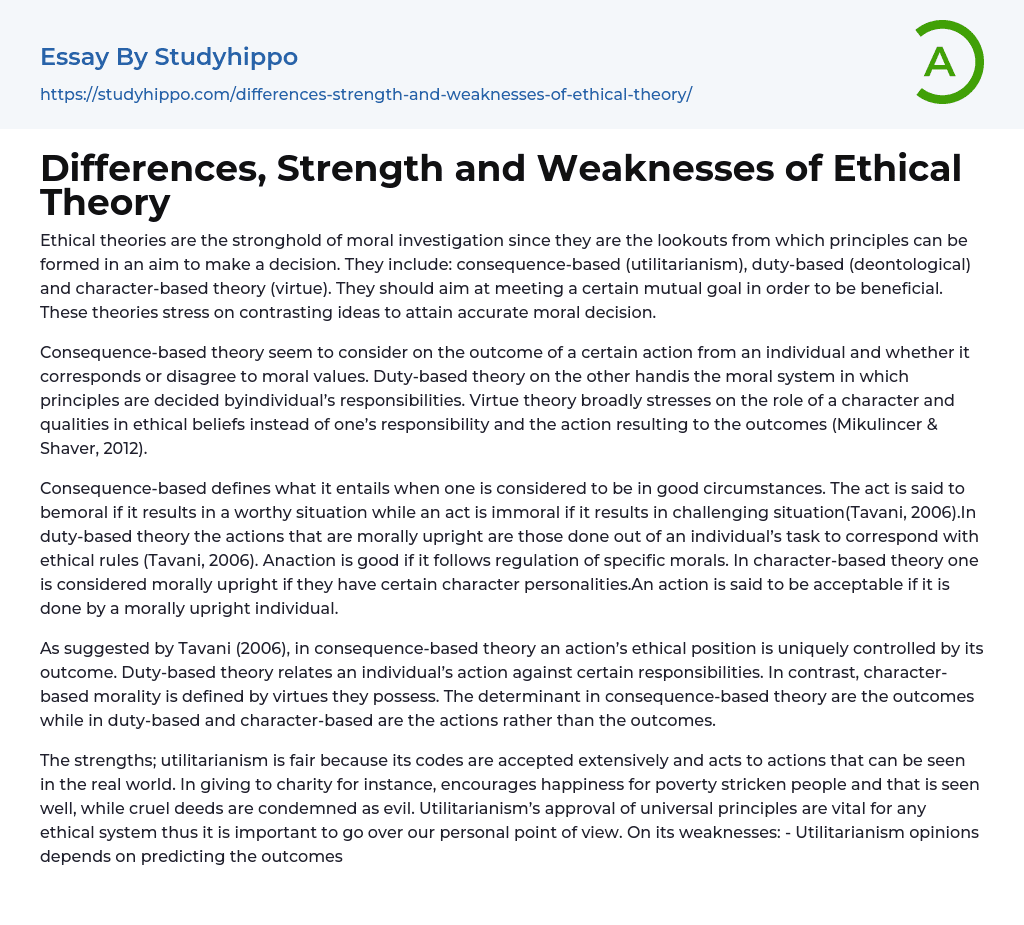

Differences, Strength and Weaknesses of Ethical Theory Essay Example
Ethical theories are the stronghold of moral investigation since they are the lookouts from which principles can be formed in an aim to make a decision. They include: consequence-based (utilitarianism), duty-based (deontological) and character-based theory (virtue). They should aim at meeting a certain mutual goal in order to be beneficial. These theories stress on contrasting ideas to attain accurate moral decision.
Consequence-based theory seem to consider on the outcome of a certain action from an individual and whether it corresponds or disagree to moral values. Duty-based theory on the other handis the moral system in which principles are decided byindividual’s responsibilities. Virtue theory broadly stresses on the role of a character and qualities in ethical beliefs instead of one’s responsibility and the action resulting to the outcomes (Mikulincer & Shaver, 2012).
Consequence-based defines what it entails when
...one is considered to be in good circumstances. The act is said to bemoral if it results in a worthy situation while an act is immoral if it results in challenging situation(Tavani, 2006).In duty-based theory the actions that are morally upright are those done out of an individual’s task to correspond with ethical rules (Tavani, 2006). Anaction is good if it follows regulation of specific morals. In character-based theory one is considered morally upright if they have certain character personalities.An action is said to be acceptable if it is done by a morally upright individual.
As suggested by Tavani (2006), in consequence-based theory an action’s ethical position is uniquely controlled by its outcome. Duty-based theory relates an individual’s action against certain responsibilities. In contrast, character-based morality is defined by virtues they possess. The determinant in consequence-based theory are the outcomes while
in duty-based and character-based are the actions rather than the outcomes.
The strengths; utilitarianism is fair because its codes are accepted extensively and acts to actions that can be seen in the real world. In giving to charity for instance, encourages happiness for poverty stricken people and that is seen well, while cruel deeds are condemned as evil. Utilitarianism’s approval of universal principles are vital for any ethical system thus it is important to go over our personal point of view. On its weaknesses: - Utilitarianism opinions depends on predicting the outcomes of action, since one can never know significances of their activities. Utilitarianism is impersonal and does not relate to the rights of an individuals in an effort for greater good (Basford & Slevin, 2003).
Deontology provides objective rules for making moral decisions without need for lengthy designs of possible results. It is also a humanitarian rule in which people are deliberated to be of equal value and needs protection. However, moral responsibilities are arbitrary except by reference to duty, thus our reality in making decisions are influenced by many factors and indeed questionable if duties are good as a motive. Also,potential does not have limits to what can sensibly be universalized. Even though, it may seem strange to claim that committing suicideis imperativeto a habitually depressed person it is perfectly reasonable (Basford & Slevin, 2003).
Virtue theory is a simple universal guide for judging moral values to human actions and purposes. Human existence is common to everyone and moral laws are made available by our reasons and make God’s motive available to a believer because people and God share the same rationality. Also, features potential goodness
and flourishing than wrongness of an act thus allows measure for flexibility. On the other hand, every individual have a particular function to accomplish. Thinking of present times we recognize variety of functions that people can suggest to accomplish.
References
- Basford, L., & Slevin, O. (2003). Theory and practice of nursing: An integrated approach to patient care. Cheltenham, U.K: Nelson Thornes.
- Mikulincer, M., & Shaver, P. R. (2012). The Social Psychology of Morality: Exploring the Causes of Good and Evil. Washington, D.C.: American Psychological Association.
- Tavani, H. T. (2006). Ethics, Computing, and Genomics. Sudbury, Mass: Jones & Bartlett Learning.
- Belief essays
- Deontology essays
- Ethical dilemma essays
- Moral essays
- Normative Ethics essays
- Values of Life essays
- Virtue essays
- Virtue Ethics essays
- Work Ethic essays
- Cultural Appropriation essays
- Double Consciousness essays
- Social Learning Theory essays
- Systems Theory essays
- All About Me essays
- Personal Growth essays
- Personal Values essays
- Strengths And Weaknesses essays



